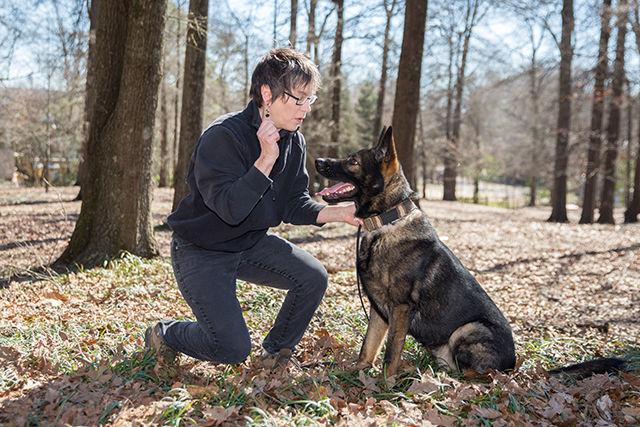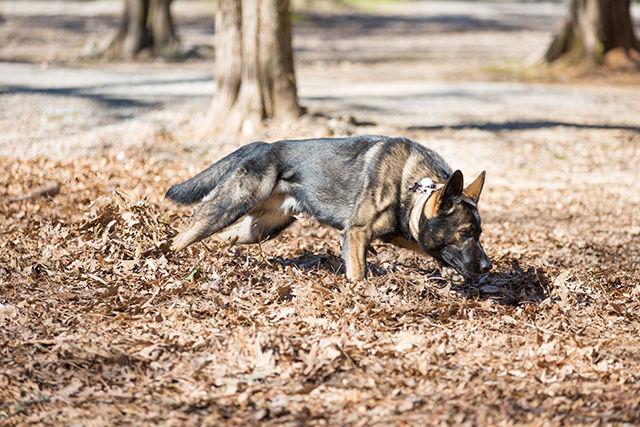“Sometimes, the worst puppies can make the best cadaver dogs,” NC State English professor and author, Cat Warren, explained to students and faculty on Feb. 15 as part of NC State’s Great Animal Semester of Seminars.
Warren is the author of the best-selling book, “What the Dog Knows: The Science and Wonder of Working Dogs,” which was published in 2013 and released in its paperback version in 2015.
Warren was born in Oregon, and about 20 years ago, she moved to Raleigh to begin teaching at NC State. Warren said she is still adjusting to North Carolina even after living here for several years, but she had several positive things to say about the state.
“I love teaching here,” Warren said. “I love watching good dog trainers and good scent dogs work here. I love the mountains and swamps. [But] I will never adjust to North Carolina’s climate. It nurtures fleas and ticks almost year round. Southern air contributes to sweat, rather than evaporating it.”
In this seminar, in which the Department of Forestry and Environmental Resources hosted, Warren specifically spoke about her first cadaver dog, Solo.
“Solo was my third German Shepherd,” Warren said. Solo was a singleton, the only pup in his litter. Often, singletons are dog aggressive because they don’t know how to communicate with other dogs properly. Solo was dog aggressive.
Warren showed photographs of Solo as a puppy. As cute as he was, she said Solo was the worst puppy she had ever owned. On the very first day in his new home, Solo tried to bite Warren.
She cried to her husband that night.
“I just don’t like him,” Warren said. “We’ll just return him,” her husband said. But that didn’t happen.
Solo’s journey wasn’t easy for anyone involved. The German Shepherd dropped out of four different puppy classes, and Warren changed veterinarians three times. Frustrated and lacking hope for her new dog, Warren enlisted the help of a trainer whom she knew well.
Solo’s new trainer gave Warren helpful advice that ended up changing both Solo and Warren’s lives. The trainer explained to Warren that her puppy wasn’t a bad dog, but just needed something to focus his energy on for him to become a well-behaved member of Warren’s family.
Thus, the pair arrived at the idea of Solo becoming a cadaver dog.
Cadaver dogs fall under the category of scent-detection canines. While other dogs might be trained to detect illegal drugs, explosives or weapons, Solo was taught to identify human blood and decomposition such as human tissue, bones and fluids. Warren and Solo volunteered with the law enforcement for about eight years.
“If somebody was missing and presumed dead, and they heard about me and Solo, they would call us out for a search,” Warren said. “But what you have to have is a dog that is very well-trained. You can’t practice on the field when someone is missing. You have to a have dog that you know is going to be dependable.”
Before beginning her journey with Solo, Warren knew nothing about the world of scent detection. However, she said that after watching Solo grow into his job, she fell in love with the work. The cadaver team of Warren and Solo grew into the NC State professor’s new “hobby.”
“I finally stopped making excuses to colleagues about the time I spent working and learning with Solo and conceded that I had become a sniffer-dog nerd,” Warren said.
Sadly, Solo passed away last April after nearly eight years of service to Warren and many North Carolina victims. However, Warren continues to train her new cadaver dog in her free time.
The newest addition to Warren’s family is Jaco, a 2-year-old German Shepherd from the Czech Republic.
“[When Solo died] we were pretty heartbroken,” Warren said. “We weren’t going to get a dog right away, but because I train with law enforcement, they bring dogs over that are meant to be law enforcement dogs. Jaco was brought here to be a law enforcement dog, but I got a chance to see and work with him, and fell in love with him. Then I was given the opportunity to buy him. We train with law enforcement trainers and handlers on a regular basis, and are having a blast.”
Warren, along with other experienced trainers, are training Jaco to do similar cadaver-dog work as Solo did with the police enforcement. After only six months of training, Jaco is almost ready for certification and the honor of being Warren’s newest partner against crime.
Warren said she is thankful to have this experience training Jaco as a cadaver dog. Although he is very different from Solo, he is also very good at what he does. According to Warren, Jaco “loves the work in a similar way that Solo loved the work.”
Warren said she even wrote her first book in hopes of informing others about the many gifts and pleasures a canine has to offer. In the book, Warren explains the recurring thought that a machine can do this work better than dogs can — that a machine can detect illegal drugs or missing people better than a dog’s nose can.
In the book, Warren quotes Kenneth Furton, analytical chemist and forensics scientist at Florida International University, where he explains that a dog’s nose is irreplaceable.
“When I started doing work in this area twenty years ago, I originally thought we would be able to make a machine that could replicate a dog, but, it’s not going to happen in my lifetime,” Furton said in Warren’s book. “We are not going to replicate what a dog can do.”
The Department of Forestry and Environmental Resources is hosting the series of seminars during the spring semester. The next event is “The Art and Science of the Duck Stamp,” and will take place on March 21 at 7 p.m. in 2203 SAS Hall, featuring Suzanne Fellows, national coordinator of the Federal Duck Stamp Program, U.S. Fish and Wildlife Service.
Dr. Cat Warren, an English professor at NC State and author of "What The Dog Knows", conducts a training exercise with her dog, Jaco in Pullen Park. In the training exercise, Jaco found training material in a mason jar that was buried in leaves, as well as one which was strapped to the side of a fence post. Jaco follows the cloud of scent the training material emits, however faint, down to its source. Jaco's job is to tell his handler, Dr. Warren, that he has detected the scent of human remains. His reward is a game of tug with a tennis ball on a string.









